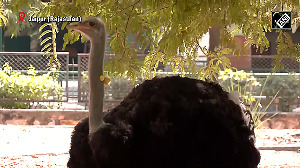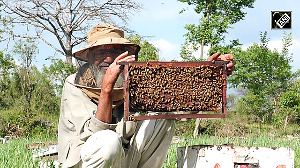The 'wagh nakh', an iron weapon shaped like tiger claws that was used by Chhatrapati Shivaji Maharaj to kill Bijapur sultanate's general Afzal Khan in 1659, is likely to be brought to Maharashtra from London in November, state Culture Minister Sudhir Mungantiwar said on Friday.

He said efforts were also on to bring the famed 'Jagdamba' sword of the 17th century Maratha warrior king from a museum in London.
Mungantiwar will travel later this month to the UK to sign an MoU (Memorandum of Understanding) to get the wagh nakh back to India.
“In the first phase we are bringing the wagh nakh. It should be brought here in November and we are signing an MoU for that. Our effort is to bring it on the day when Chhatrapati Shivaji Maharaj disembowelled Afzal Khan,” Mungantiwar said.
The wagh nakh is likely to be housed in the Chhatrapati Shivaji Sanghralaya (museum) in south Mumbai.
The killing of Afzal Khan marks an important chapter in the annals of Maratha history. Superior in numbers, Khan's powerful army was defeated by the Marathas using guerrilla warfare.
The legendary Maratha king killed Khan using a wagh nakh, a sharp iron made weapon shaped like tiger claws, (when the two met at the foot of Pratapgad fort in present-day Satara district) and since then the episode has become a part of the folklore.
“When Afzal Khan stabbed Shivaji Maharaj in the back (during the meeting), Shivaji Maharaj used a 'wagh nakh' to kill the cruel, demonic Afzal Khan," said the minister.
"The wagh nakh is a source of inspiration and energy for us. This year also marks the 350th anniversary of Shivaji Maharaj's coronation,” he said.
According to the London's Victoria and Albert Museum, where the 'wagh nakh' is currently housed, the weapon belonged to James Grant Duff (1789-1858), an officer of the East India Company who was appointed Resident (political agent) of the then-Satara state. The relic was given to Duff by the then-Peshwa (Prime Minister) of the Maratha empire.











 © 2025
© 2025